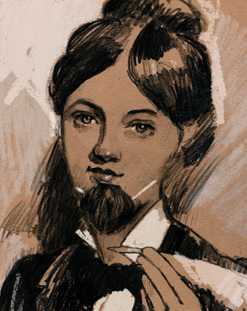 loading
loading
Anonymous was a woman Illustration: Michael GilletteView full imageThe Forgotten
This phrase has become so common that many people assume it is a proverb. In the familiar form quoted here, it originated with Mary de la Rivière Manley (1663–1724), an English novelist and playwright, who used it in her 1696 play The Lost Lover.
It was Anne-Marie Bigot de Cornuel (1614–1694), the hostess of a Parisian salon and a much-cited wit, who made this quip about the indignities of familiarity. We know her as the source because of a 1728 letter written by another Parisian, who quoted Cornuel years after her death: “Il n'y avoit point de héros pour les valets de chambre.”
The ditty now sung by every English-speaking three-year-old was published in 1806 in Rhymes for the Nursery, by Ann Taylor (1782–1866) and Jane Taylor (1783–1824), English sisters and the coauthors of several books of children's poems. These four lines are the opening lines of "The Star." Though the poems lack individual bylines, both Ann's son and the sisters' nephew later said Jane was the author.
The first words recorded on Thomas Edison's phonograph were the words of this ubiquitous poem. "Mary's Lamb" was written by Sarah Josepha Hale (1788–1879), one of the first major U.S. female writers and a hugely influential editor of women's magazines. She also led the campaign to make Thanksgiving a national holiday.
Proverb? No, this too was written by a woman, an American named Ella Wheeler Wilcox (1850–1919). Her 1883 poem "Solitude" begins with these words.
Online, one can find this remark credited to King Edward VII and an eighteenth-century general, as well as to the person with the best claim: Mrs. Patrick Campbell (Beatrice Stella Tanner Campbell, 1865–1940), the preeminent actress of her time on the London stage. She used this memorable line in rebuking an actress who had complained that an actor they knew was enamored of a young leading man.
These lines, spoken by Robert Armstrong at the end of King Kong (1933), are among the most famous in the history of cinema. They can be ascribed to the U.S. writer Ruth Rose (1896–1978). She and James Creelman received joint credit for the Kong screenplay, but she wrote the final script and rewrote all of Creelman's dialogue.
This ubiquitous slogan of the Vietnam War era originated on a poster by U.S. artist Lorraine Schneider (1925–72).
The American Film Institute ranks this line 15th among the top 100 quotations of U.S. cinema. The screenwriter for E.T.: The Extra-Terrestrial (1982) was Melissa Mathison (b. 1950).
|
|